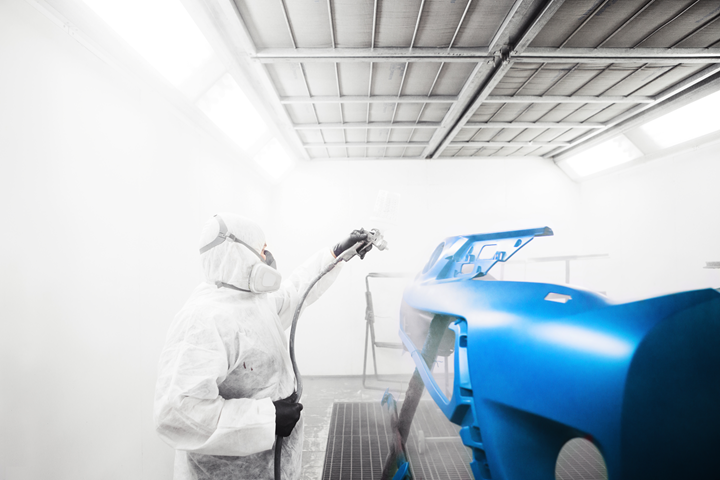How to Keep Your Paint Booth In Peak Condition
Proper cleaning and maintenance are crucial for keeping your finishing equipment running optimally. Bill Day of Global Finishing Solutions discusses 5 ways to keep your paint booth clean and operating efficiently.

Proper cleaning and maintenance methods in your paint booth help promote higher-quality paint jobs, reduce rework and contribute to longer-lasting parts and components. They are also critical for the protection of your employees and facility. Here are the top five things you can do to protect your paint booth and keep your finishing equipment running efficiently:
1. Establish a Preventative Maintenance Schedule
Your solutions provider or distributor should offer preventative maintenance and service programs to ensure your paint booth stays in peak condition, in addition to saving your business time, hassle and costly repairs down the road. Customized to your needs, these programs may include just-in-time filter replenishment and replacement, paint booth cleaning, peelable booth coating application, complete diagnostic checks, and emergency service. Check for weekend and after-hours service to fit within your shop’s schedule and reduce downtime.
A maintenance schedule provides guidelines for how often to inspect, clean and replace key components of your paint booth, such as intake and exhaust filters. While some components should be inspected and cleaned daily, others may require only an annual inspection, depending on your paint booth usage.
2. Regularly Change Paint Booth Filters
Replacing intake and exhaust filters on a routine basis is one of the simplest things you can do for the cleanliness and overall productivity of your paint booth. Proper airflow can be hindered by clogged or overloaded filters, causing dust or overspray to recirculate and affecting the finish of your paint job. The likelihood of equipment failure is decreased by regularly changing your booth’s filters, in addition to helping ensure your booth is operating efficiently and keeping the production costs of your shop low.
To measure a pressure differential, a manometer indicates when paint booth filters are loaded and need replacement. By monitoring the filters with your manometer, painters and service personnel know when it is time to change the filters. If your booth lacks a differential pressure gauge, a strict maintenance schedule should be established based on the time spent spraying in the booth.
Perhaps the most common maintenance mistake shops make is not following the filter changeout schedule specified by their paint booth manufacturer. While your booth’s exhaust filters should be changed every 100 operating hours or every three to four work weeks, each paint operation is different, which may require changing exhaust media more frequently.
3. Protect Your Paint Booth Walls with Strippable Coatings
Strippable paint booth coatings offer outstanding coverage to protect your equipment, shop and employees, making it easy to keep the walls of your booth clean. These types of solutions, such as Booth Shield from GFS, trap the overspray that collects on booth walls, so you can save valuable time, avoid unnecessary hassle and achieve better-quality paint finishes.
While temporary, strippable booth coatings keep your paint booth cleaner and help your booth last longer. Since white walls are more reflective to create a brighter spraying environment, strippable coatings boost visibility and aid in precise paint application.
4. Use a Protective Floor Covering in Your Paint Booth
Protective floor coverings are another great solution for trapping overspray, dirt, dust and particles for better-quality paint finishes and a safe, bright working environment. One example is the PIG Grippy Mat from GFS, a unique, adhesive floor covering for paint booths. It is simple to install and peels up easily for quick change-outs.
5. Activate Summer/Winter Mode on Your AMU
To ensure consistency for both spraying and curing, in addition to increasing efficiency and reducing rework, the temperature in your paint booth should be regulated, regardless of the temperatures outside. Take advantage of any seasonal settings on your air make-up unit (AMU). For example, a baseline temperature for the booth is more easily established with summer/winter mode on GFS AMUs. So even as the seasons change, some of the problems associated with frequent temperature fluctuations are eliminated, keeping your finishing operation running smoothly.
Summer mode should be turned on in the spring, usually in April, when cool mornings can give way to warm afternoons. The switch to winter mode is best in the fall, typically in October, when the weather is perhaps the most unpredictable.
With summer mode activated, the burner on the paint booth heater remains off when the booth is in spray mode. For winter mode, the burner turns on in spray mode, providing heat and humidity control to the booth. A 10° bump above ambient temperature is attainable with the burner on — especially helpful for working on temperature-sensitive products. Already having the burner on is also a time saver when it comes time to cure.
About the Author

Bill Day
Bill Day is the preventative maintenance trainer for Global Finishing Solutions. Visit globalfinishing.com.
Related Content
Curing Oven Basics
Simply heating up the substrate does not cure the coating. There are many variables to consider when choosing the best cure oven for your application...
Read MoreCobot Enters Paint Industry With Safety at the Forefront
This collaborative robot is the first explosion-proof solution for the powder coating and paint arena that meets the U.S.’ stringent safety requirements. Its lead-through teach programming and tablet control are especially appealing to small shops with little proficiency in robotics.
Read MoreSurface Prep Solution for Rusted Rebar in Concrete
Julie Holmquist of Cortec Corporation discusses passivating corrosion on rebar and other reinforcing metals.
Read MoreMix of Automation and Skilled Employees Generates Quality
This Pennsylvania plating company’s general manager shares insights about being recognized as a Top Shop for several consecutive years as well as his thoughts about automation, customer service, hiring skilled workers, the challenges of installing a new line and more.
Read MoreRead Next
Episode 45: An Interview with Chandler Mancuso, MacDermid Envio Solutions
Chandler Mancuso, technical director with MacDermid Envio discusses updating your wastewater treatment system and implementing materials recycling solutions to increase efficiencies, control costs and reduce environmental impact.
Read MoreEducation Bringing Cleaning to Machining
Debuting new speakers and cleaning technology content during this half-day workshop co-located with IMTS 2024.
Read MoreDelivering Increased Benefits to Greenhouse Films
Baystar's Borstar technology is helping customers deliver better, more reliable production methods to greenhouse agriculture.
Read More













.jpg;maxWidth=300;quality=90)







